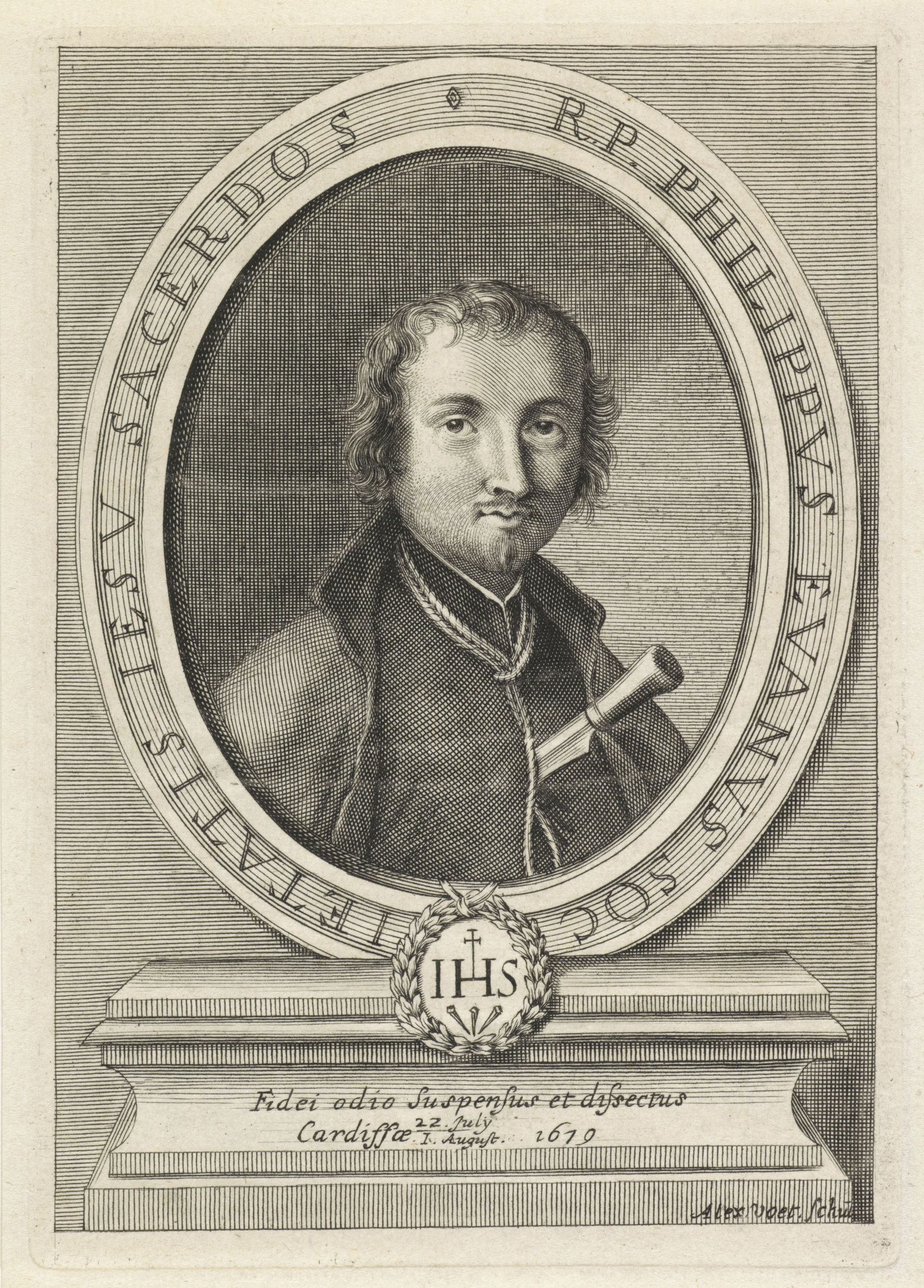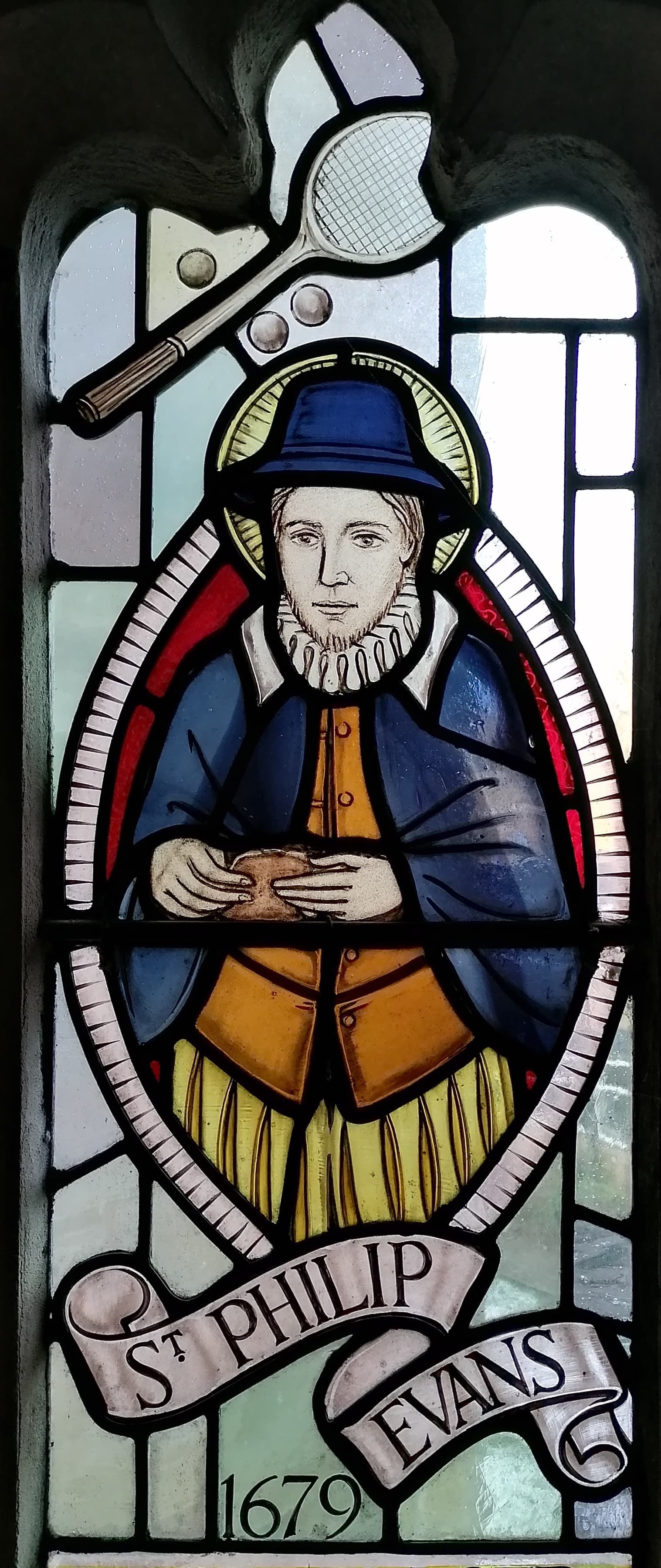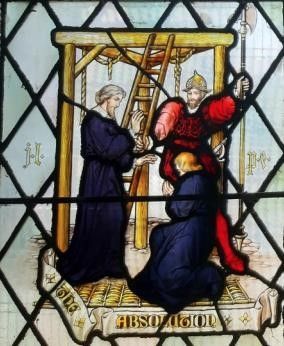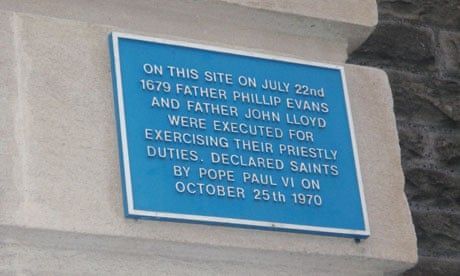The Martyrdom of Sts Philip Evans & John Lloyd
An account of the martyrdom of St Philip Evans, S.J. and St John Lloyd, S.J.
by the Rev. John M. Cronin. I.C. (St Peters Magazine. July 1929.)
An account of the martyrdom of Blessed Philip Evans, S.J. and Blessed John Lloyd, S.J. by the Rev. John M. Cronin. I.C. (St Peters Magazine. July 1929.)
It happened just over two hundred and ninety years ago. It was the eve of St Mary Magdalen's Day 1679. Within the confines of the gaol in Cardiff Castle the prisoners were taking their recreation. Among them was a man of venerable appearance, there was an air of refinement about him. His education in Spain some thirty years previously and his virtuous life had left an indelible stamp on him. He had been confined within the walls of the Castle ever since the 20th November, having been brought up under guard from Penyllyne near Cowbridge as a suspected Priest. His cell in the Black Tower was probably “The Harrow Cell" a vaulted stone cell 16ft by 17ft which had an earthen floor. It was lit up by a slit high up and by the low door which pierced the very thick wells that looked across the court.
The young man of thirty years and more was his companion in imprisonment and shared his cell. He too had been committed as a suspect priest to the Castle on Dec. 4th, by the magistrates who with the pursuivants had seized him in Mr Tubervilles house at Porthcawl. He had firmly but respectfully declined to take the oaths of supremacy and allegiance, Test oaths they were called. The magistrates, some of whom were inclined to be friendly, tried every means of persuasion to induce him to yield. When he refused he was brought to the Castle and confined in the under ground cellar, beneath the floor of the neighbouring cell called the White Cell. This cell had no windows but a door leading into it to light it, and in the middle of the stone floor is a trap door, down which he was put into the dark dungeon beneath. This is 12ft by 6ft wide and the vault roof of it springs at a height of 7ft. from the floor. Here for 3 weeks he lay in solitary confinement in the hope of breaking his iron will and resolution. It failed in its object. On. Christmas Day he was brought up at the insistence of friends and was placed in the Harrow Cell. For 7 months the two men were to live together in this cell, preparing for the inevitable fate that awaited them.


Over in the Shire Hall within the Castle walls the two priests were eventually arraigned Thursday 8th May before Judge Owen Wynne. They were indicted before the Grand Jury of the County of Glamorgan whose names are preserved for us and when a true bill had been found six of those justices together with Richard Lougher, one of the Justices who had committed one of them to prison, were, with 5 others, sworn on the Petty Jury to try the Priests. John Lloyd, for such was the name of the older one, was over 60 years of age, and Philip Evans were both found guilty of the crime of being priests; to use the Legal phrase "made, ordained, and professed by the authority and jurisdiction derived, challenged and pretended from the Roman See...." and that they, on a certain day, came to, were, and remained within the Principality. One can picture the scene in the Shire Hall in the outer wall of the Castle. There were the women and the men, that were called to give evidence against them.
Each of the priests, they said was seen to say Mass, to preach the word of God in English and Welsh, and to give holy Communion. A certain dwarf, an apostate tried to implicate the youngest priest in the plot, but the Judge rightly ruled it out for want or support. The Judge relied on the women’s evidence. No sooner had the judge said this, than one of the Jury, Richard of Beaupre (he was knighted 2 years later) with an oath said: "Be it so; come let us find him (Fr Evans ) guilty at once. His advice was instantly followed. Then came the dread sentence, that they were to be drawn to the Gallows of Cardiff and there be hanged by the neck, and while alive be thrown down upon the ground, and the entrails be taken out and burned while they still lived, and their heads be cut off and their bodies be divided into four portions; and that the heads and those quarters be placed where our Lord the King is pleased to assign them. The prisoner, Fr Evans, when brutel sentence was announced, received it with cheerful countenance, bowed to the Judge and thanked him. With great joy he returned to his companion in gaol who had probably been sentenced already. Days passed and the execution did not take place. And it thought that they would be reprieved. The chains and shackles which had been placed upon them on their conviction were removed after a time. And a certain measure of freedom was permitted them. The whole of May and June passed, and 3 weeks of July too... The Parliament, it was known, was determined to exact the full penalty from every priest lying under sentence of death in the gaols of the country. but there was no sign so far. At least there was no confirmation of fact that the King and his Privy Council had acceded to the address of the Commons. On this evening then, Fr Lloyd Was recreating himself with young and devoted friend, whose tennis no doubt had all the zest in it which his wonderful missionary work had in the few years that spent in Monmouthshire and Glamorgan among his Catholic flock. Gay and gallant with a heart that was young and with nature that was refined by such accomplishments as music, the dread sentence did not weight heavily upon today. He must have been of soldierly bearing as it was known that he passed to and fro in his missionary circuits as Captain Evans. This young priest then a worthy disciple of St Ignatius, soldier of Pampeluna, was in a moment to reveal that he had a stout heart and an ordered will for whatever task lay in front of him. Whilst the game was still in progress, the Sheriff had received important news of an order of Privy Council made ten days before. The Under Sheriff, Charles Evans of Llantwit Fardre, came to acquaint Fr Evans that he was to be executed on the following day to bring him back to prison. "What haste is there?” he exclaimed, "Let me first play out my game!” This he did, returning afterwards with his gaoler to his prison cell. He and his companions as convicts were placed in irons. These they joyfully kissed.
The news spread rapidly through the town of Cardiff. Protestants and Catholics alike thronged to the prison to express their regret and to bid farewell to the two priests whom they had come to regard with affection. To the Catholics, we are told, they gave advice, exhorting them to constancy in their faith and patience in their sufferings. The hearts or the two priests, in spite of the sad farewell, were yet full of joy at their approaching death. Evans, we are told asked the Governor for a harp on his return to prison and, accomplished musician that he was he poured out the pent up feelings of his soul by playing upon it. Neither did the young forget priest his sister, who had been professed a Blue Nun at Paris the week that he was sentenced to death. He wrote to her now a last letter to give her news that “her loving brother” was in a few hours to suffer as a priest and consequently for God's sake. She with all friends and relations should joy and congratulate him on such great happiness. He signed the Letter 21st July 1679, "Your dying brother". How the two priests spent their last we can well imagine. It was a night of preparation for the sacrifice for conscience sake tomorrow.
The dawn broke to find priests on the watch and at prayer. And their thoughts turned too, to the friends that they were leaving. Two letters of Fr Evans written on the morning of the memorable day were found in prison cell. Their text has, been preserved. one was ddressed to a loving friend whom the younger priest had served together with his worthy family. It voiced his gratitude for favours received. It promised prayers; "daily and requests unto Almighty God… for goodness towards me.” It may have been addressed to the Tubervilles at Sker, in whose house he was taken. The second letter to an affectionate friend imploring the mercy and favour of God on him and his worthy family. If his friend and Superior Fr David Lewis he was still alive … is was awaiting a cruel death in Usk gaol at the time… he wishes to be recommended to him. This letter may have been addressed to one of the Gunters or Needham or to some other Catholic family North West Monmouthshire. "Just this afternoon are going to execution" he adds "Do not lament for me but rejoice. My time is short.” He would not forget his friend; he would be a friendly soul gone to the tribunal of Almighty God, would remember his needs and those of his family. These letters show the spirit of the priest and the martyr: full of affection, tender remembrance, and active gratitude for all past kindness and favour.
At 9 o’clock in morning the Under Sheriff came to the cellar in the gaol. A smith called to take of the shackles on the prisoner. For an hour the craftsman laboured to undo those of Fr Evans which caused intense pain, but he bore it with great patience: encouraging the man to do his job, who at one time threw down tools and refused for fear of the priest. They were eventually brought out of their dungeon from the foul atmosphere of which they were at last freed once and for all. They asked the Sheriff to be allowed to walk to the place of their execution. Their request was refused.

They were placed upon on a cart, their arms were pinioned but such a way that they were able to recite the Divine Office as they were drawn along. It was now the afternoon as the grim procession moved out of the Castle gate and along the street leading to the East Gate. As they passed they caught a glimpse of St Johns Church, with which the Castle Keep and the Black Tower are the only buildings of the old town that have survived til our day. The cart dragged its weary way surrounded by the guard of Sheriff, Bailiffs and a crowd of townsfolk that followed it out into Crockhertown. It was along a rough uneven road that they came. The priests prayed together as they were drawn • A quarter of an hour• sufficed for them to reach Payn’s Cross, or as it was then called Longcross on the Newport Road... today it is called City Road junction. Here the cart and its escort turned North along Plucca Lane ( City Road ), a rough track that wended its way towards the Village of Roath. On the top of this lane were the Gallows Fields. These were 4 plots of one acre each of the little heath… the top portion of Richmond Road divides the Gallows Fields in two today. Their old titles preserve in their grimness the memory of this ancient place of public execution
- The Gallows Pit.
- Pwll—halog (defiled pool) or Plucca-halog ( Defiled Pleck)
- Cut-throats and
- Cae-pudr (Putrid Close)
We are told by an onlooker that as the cart approached the place of execution the priests secretly confessed and absolved another, and made an agreement that the survivor should give the last absolution to the other. Descending from the cart at the Gallows, they, like St Andrew, said, "Welcome good Cross!” and fell and kissed the post of the Gallows. They remained in prayer a good time. They then asked the Sheriff who should die first and he said “Fr Evans”.
The young Priest stood forth with courage and delivered the short speech that he had prepared, as was customary at this period. He died for his priesthood, for religion, for conscience sake, but not for a plot. He nobly forgave his enemies. He asked forgiveness if he had offended any man. “I pray God bless the King. I ask the prayers of all and in particular of the Catholics here present". He again knelt down with friends evidently the Catholics had responded to request.
They prayed a while and he took leave of them. He then ascended the ladder and spoke again. It was his best pulpit, “I die for God and for religions sake.” He was happy to do so. He forgave all who had any hand in his death, accusation or condemnation. He thanked all who had been to kind to him especially Under Sheriff Charles Evans. "Adieu Mr Lloyd though for a little while, for we shall shortly meet again. Pray for me all, and I shall return when it pleaseth God that I shall enjoy the Beatific vision. After a few more words he recollected himself and with a tender feeling he said “Mr LIoyd, do what you promised.” Lloyd lifted his hand in absolution. The martyr raised his voice in a clear and cheerful manner "In manus tuas domine, commendo spiritum muem” and gave the sign to the Executioner who adjusted the rope end turned him over. The Ladder was very short and it stirred with the priests body, so "Richard Jones, one of the Sheriffs bailiffs, took his legs" from the ladder, and turned him after the body.
"And he remained hanging,” says a contemporary account.
The old priest stood by and looked on at the frightful but glorious death of the heroic young priest "with as much constancy and cheerfulness as any man could have.” Before he went up the ladder, he too spoke a few brief words of faith, forgiveness and thanks. He struck his breast three times saying "God be merciful to me a sinner.” He too, giving the sign was turned over. A portion of the rope that hanged them, and a portion of a cloth steeped in the blood of Evans have been preserved. Nothing is known of the disposal of their bodies. But. their memory lives forever in the annals of the Church of their native land. This year will see please God the solemn recognition of their heroism or these two noble priests who suffered in our midst for the faith, which flourishes around the place of their martyrdom.


